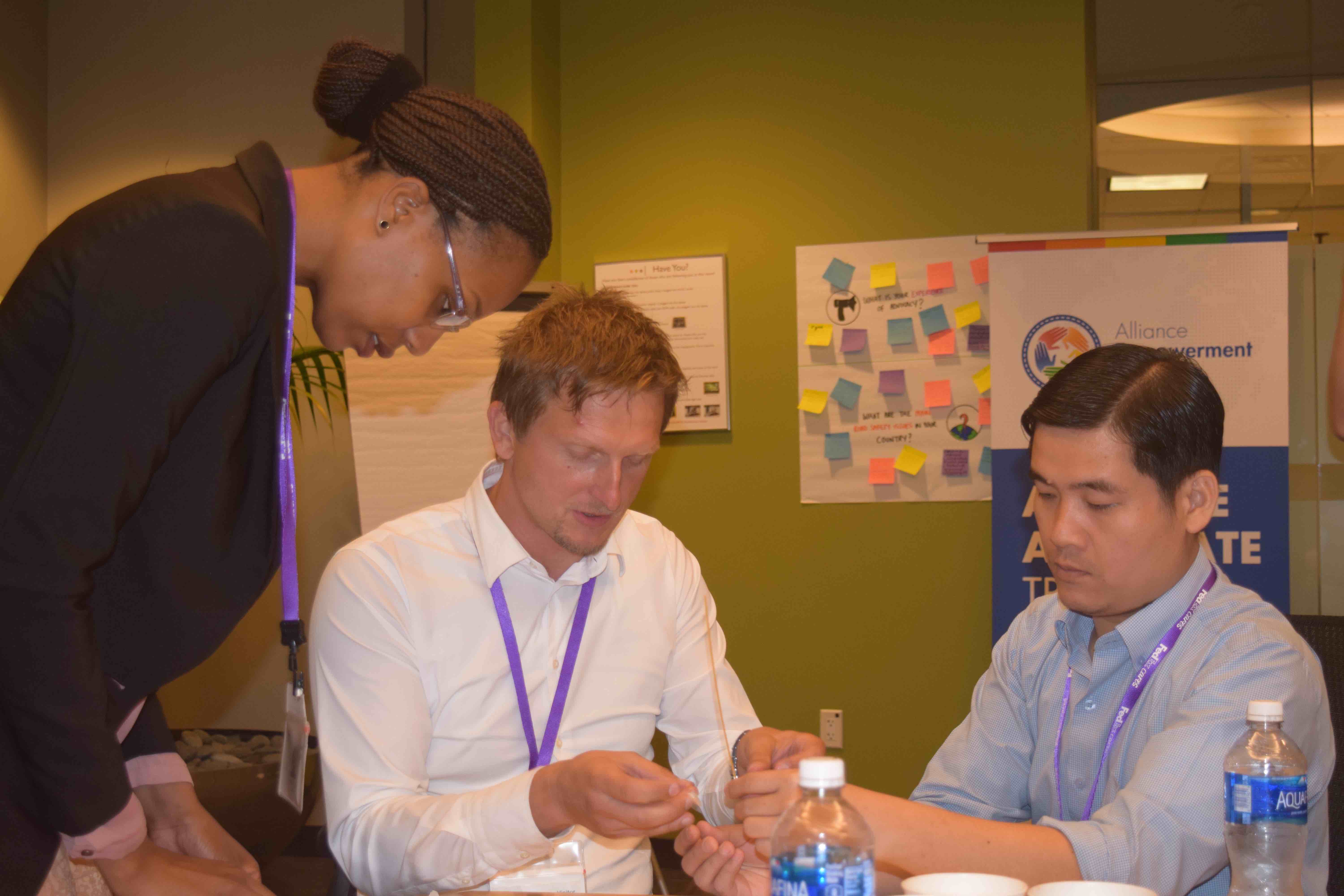
The Alliance Advocate program is the centerpiece of the Alliance’s capacity-building effort, the Alliance Empowerment Program. Its function is to equip an elite group of Alliance member NGOs to make a significant impact on the road safety agenda around the world.
Texel Cossa, Amend, Mozambique, and David Razboršek, Zavod VOZIM, Slovenia are two of the 2017 cohort of Alliance graduates. We interviewed them midway through the intensive two-week training program in Memphis to get their views on what makes the training so special and how it will impact their work.

“As a road safety NGO, our main goal is to save lives,” says Texel Cossa, Amend Mozambique, “and the main tool is advocacy.” Texel applied for the Alliance Advocates program because she realized it was an opportunity to gain advocacy skills that would help her and Amend Mozambique achieve their goals and contribute to the Global Goals. When she was accepted for the program, she says she was both “overwhelmed with joy” and conscious of the “huge responsibility of being one of 14 advocates chosen to support the 192 [members of the Alliance].”
On arriving in Memphis, Texel brought some expectations about the training: “When we talk about training, I was well prepared for a lot of PowerPoint presentations, a lot of listening and note-taking. I expected a lot of information and to focus hard.” The reality was very different. “It was beyond my expectation,” she says describing the energy-boosting activities, interaction, and shared experience of the group: “Everyone was completely involved, and the facilitators made sure we were on the same track and that everyone understood.” She praises the facilitators: “they made it look so easy and practical.” For Texel, the highlight of the training so far has been “how they managed to transform a group of 14 Alliance members into a happy family with the same vision. If we are to represent 192 members of the Global Alliance, we need to be able to work as a team; they have turned us into one spirit and one voice in a short period of time.”
The training will have a lasting effect on Texel’s work. “After training,” she says, “everything we do will be SMART from the beginning…identifying our objectives and sticking to them.” Texel’s action plan focuses on safer road users in Mozambique and, in particular, safe school zones and safe journeys to and from school. “I have gained powerful tools to go back and execute our plans successfully,” she says. It hasn’t just been the training that has inspired Texel, the environment itself has showed her how the job can be accomplished. “It is quite helpful to have such training in an environment like this [at the FedEx headquarters],” she says. “It is a good example to see the practical things. If FedEx can do it on a huge scale—the planning, goals, execution—then a small NGO should be able to too. It has been an amazing experience: making things clear by example.”
 Zavod VOZIM, Slovenia, which represents injured road victims, is expanding and aims to save more lives. David Razboršek knew that, to do this effectively, the organization would need to be more efficient and gain advocacy skills. He also knew that, if he were accepted into the Alliance Advocates program, it would put him and the NGO into, what he describes as, a “faster and more efficient gear.” He also says: “Our story, our members’ story, would not become other people’s story.” Like Texel, when he found out he would be going to Memphis, he was honored, but recognized the commitment it represented to Zavod VOZIM and to the Alliance.
Zavod VOZIM, Slovenia, which represents injured road victims, is expanding and aims to save more lives. David Razboršek knew that, to do this effectively, the organization would need to be more efficient and gain advocacy skills. He also knew that, if he were accepted into the Alliance Advocates program, it would put him and the NGO into, what he describes as, a “faster and more efficient gear.” He also says: “Our story, our members’ story, would not become other people’s story.” Like Texel, when he found out he would be going to Memphis, he was honored, but recognized the commitment it represented to Zavod VOZIM and to the Alliance.
Now in Memphis, the training has exceeded his expectations in many ways. “I didn’t expect the team to be so connected,” says David, referring to the advocates’ working range of countries, backgrounds, environments, and conditions. A highlight for him has been the energy and passion of the group. “When you have the same values and vision, it boosts you up and makes your vision and commitment for change stronger.” He further comments on how well-structured and well-prepared the training has been while also being relaxed, practical, and productive.
David is convinced that what he is learning in the training will have a big effect on his work back in Slovenia and in neighboring countries. “The improvement will be how to do it more professionally: more efficiently, goal-oriented, and evidence-based,” he says. “The whole process of advocacy in every phase will be more efficient and will result in saving more lives…I can’t wait to take that back…This is training that NGOs need to have. We are the second generation of graduates, and I hope there will be 100 generations. It will change the way people work significantly and will have a positive snowball effect on road safety”
As a final word, David says: “Thanks to all—a lot of work has gone into preparing such great training,” giving nod to the Alliance, FedEx, the trainers and facilitators, and even the hospitality team.